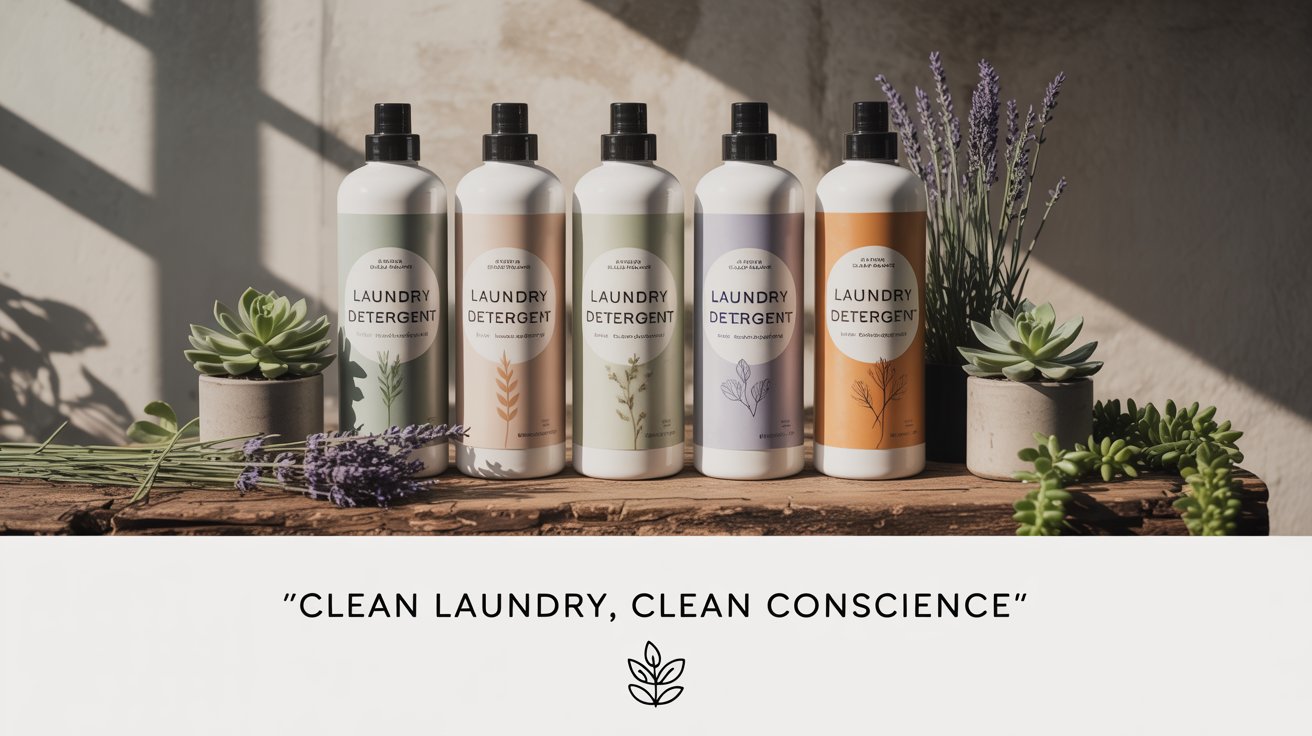Eco-Friendly Laundry Detergents: Sustainable Choices for a Cleaner Planet

In an age where environmental consciousness is more important than ever, the way we clean our clothes has come under the spotlight. Every time you start a wash cycle, the detergent you use plays a small yet significant role in global sustainability. A laundry detergent environmentally friendly is more than just a cleaning agent—it’s a mindful choice that affects water systems, aquatic life, and your carbon footprint. With so many brands marketing themselves as “green” or “eco,” it can be difficult to distinguish genuine sustainability from clever packaging. This guide breaks down everything you need to know about truly eco-friendly laundry detergents—from ingredients to performance and best practices—helping you make informed, planet-friendly decisions.
What Makes a Laundry Detergent Environmentally Friendly?
An environmentally friendly laundry detergent is formulated to minimize harm to ecosystems while maintaining cleaning effectiveness. Traditional detergents often contain phosphates, synthetic fragrances, and surfactants that can persist in the environment. Eco-friendly detergents, however, use biodegradable ingredients, derived from renewable sources like coconut oil or corn-based surfactants, that break down naturally.
What sets these detergents apart is their low toxicity and high biodegradability. They are designed to work effectively at lower temperatures, reducing energy consumption during washing. Many are concentrated, meaning you use less product per load, which reduces packaging waste and transport emissions. When used correctly, they protect not only your clothes but also rivers, lakes, and oceans.
Trusted Eco Labels and Certifications
With so many “green” products on the shelves, certifications are a reliable way to identify genuine environmentally responsible detergents. Here are some respected eco labels to look for:
- EPA Safer Choice (USA): Ensures all ingredients meet safety standards for human and environmental health.
- EU Ecolabel: Focuses on the full life cycle of a product—from raw material extraction to disposal.
- Nordic Swan Ecolabel: Restricts hazardous substances, limits packaging waste, and tests for performance.
- Blue Angel (Germany): Recognizes detergents that have reduced environmental impact across production and use.
These certifications provide transparency and peace of mind, guaranteeing that the detergent meets rigorous environmental and safety standards rather than simply relying on marketing claims.
Ingredients to Look For (and Avoid)
Choosing a laundry detergent environmentally friendly starts with understanding its ingredients.
Eco-Friendly Ingredients Include:
- Plant-based surfactants: Derived from coconut or palm kernel oil, these clean effectively and biodegrade quickly.
- Natural enzymes: Break down stains and dirt at lower temperatures.
- Mineral-based builders: Like sodium carbonate or zeolite, which replace harmful phosphates.
- Essential oils: Used in small, controlled amounts for fragrance instead of synthetic perfumes.
Ingredients to Avoid:
- Phosphates: Lead to eutrophication, damaging aquatic ecosystems.
- Optical brighteners: Persistent chemicals that give a false “whiter-than-white” effect.
- Chlorine bleach: Highly toxic to aquatic life.
- Synthetic fragrances and dyes: Can cause allergies and contribute to water pollution.
- Nonylphenol ethoxylates (NPEs): Break down into harmful endocrine disruptors.
When you understand the label, you gain control over your environmental footprint and can confidently select a detergent that aligns with your values.
Types of Eco-Friendly Laundry Detergents
The green laundry market offers several forms, each with pros and cons:
- Powder Detergents: Traditionally more concentrated and often packaged in recyclable boxes, they have a lower transport footprint. Ideal for hot or warm washes.
- Liquid Detergents: Easy to measure and work well in cold water, but heavier to ship. Choose concentrated liquids in refillable containers.
- Pods or Capsules: Convenient but often contain polyvinyl alcohol (PVA) films, whose biodegradability in the environment is debated.
- Laundry Sheets: Lightweight, water-soluble, and zero-waste when sourced from verified biodegradable materials.
The key is not just the form but the formulation and packaging. A truly eco-friendly detergent combines effective cleaning with minimal waste and maximum sustainability.
Environmental Impact: Beyond the Bottle
It’s not just what’s inside the bottle that matters—how it’s made, used, and disposed of makes a huge difference. Conventional detergents contribute to microplastic pollution, carbon emissions, and toxic wastewater. In contrast, eco-friendly detergents use renewable resources, recyclable packaging, and concentrated formulas to reduce environmental impact.
Manufacturers are also adopting closed-loop production systems, where waste materials are reused, and carbon-neutral manufacturing to offset emissions. Some brands even offer refill stations or plastic-free packaging, significantly cutting down on single-use plastics.
By switching to an eco-friendly option, a single household can prevent kilograms of chemical pollutants from entering waterways annually—a small change with a big cumulative impact.
Sustainable Washing Habits: Amplify the Impact
Even the greenest detergent won’t fulfill its potential if laundry habits remain wasteful. Adopting sustainable washing practices can amplify environmental benefits.
- Wash in cold water: Around 90% of a washing machine’s energy goes into heating water. Cold washes save energy and keep fabrics intact.
- Use the correct dosage: Overdosing not only wastes detergent but also increases chemical load in wastewater.
- Full loads only: Maximize machine efficiency by washing full loads instead of several small ones.
- Air dry when possible: Dryers consume a significant amount of electricity. Sun and air are free, renewable, and gentle on fabrics.
- Prevent microfiber pollution: Use a microfiber-catching laundry bag or filter to reduce plastic shedding from synthetic fabrics.
Small behavioral changes can multiply the positive impact of using eco-friendly detergents, making your laundry routine genuinely sustainable.
Choosing the Right Eco Detergent for Your Needs
Selecting the perfect laundry detergent environmentally friendly depends on your lifestyle, budget, and preferences:
- For sensitive skin: Opt for hypoallergenic, fragrance-free detergents certified by dermatological associations.
- For baby clothes: Choose ultra-gentle, enzyme-free formulas with no synthetic fragrances.
- For hard water: Look for detergents with natural water softeners like citric acid or baking soda.
- For heavy-duty cleaning: Bio-detergents with multiple enzymes can tackle tough stains even at low temperatures.
Price doesn’t always equal performance. Many affordable eco brands outperform premium ones while adhering to strict environmental standards. Reading labels and checking certification logos is always the smartest step.
Top Eco-Friendly Laundry Detergent Brands in 2025
Here are a few noteworthy sustainable brands recognized for their genuine eco practices:
- Seventh Generation: Widely available and certified by EPA Safer Choice.
- Ecover: Offers plant-based formulas and 100% recyclable packaging.
- Method: Known for stylish, biodegradable formulations and cruelty-free credentials.
- Tru Earth: Popular for ultra-light laundry strips with zero plastic packaging.
- Dropps: Concentrated pods with compostable packaging and carbon-neutral shipping.
Each brand demonstrates innovation and transparency, ensuring consumers don’t have to compromise on cleanliness for sustainability.
Common Myths About Eco-Friendly Detergents
“Eco detergents don’t clean as well.”
Modern green detergents use advanced enzyme technology that performs effectively even in cold water.
“Natural means 100% safe.”
Not always. Some natural ingredients can still cause irritation or harm aquatic life. Always rely on certified products, not just “natural” labels.
“Pods are automatically biodegradable.”
Not entirely true. The PVA films used in pods vary in biodegradability depending on wastewater treatment systems.
By understanding these myths, consumers can make informed decisions and avoid greenwashing traps.
The Future of Sustainable Laundry
The cleaning industry is evolving rapidly toward circular economy principles. Expect to see innovations such as refill stations in supermarkets, biotech-driven enzymes, carbon-neutral factories, and fully compostable packaging. Governments and consumers are both pushing for stricter environmental regulations, while detergent companies are investing in research to make cleaning agents safer, smarter, and more sustainable.
The future of laundry is green—and each purchase sends a powerful message that sustainability matters.
FAQs
Are eco-friendly detergents safe for septic systems?
Yes, most are septic-safe because they use biodegradable ingredients that break down naturally.
Do green detergents work in cold water?
Absolutely. Enzyme-based formulas perform well even in low-temperature washes.
Can I use eco detergent in high-efficiency (HE) washers?
Yes, most eco detergents are low-sudsing and designed for HE machines.
What’s the best detergent for sensitive skin?
Fragrance-free, dye-free options like Seventh Generation Free & Clear are dermatologist-approved.
How can I tell if a detergent is truly biodegradable?
Look for certifications such as EU Ecolabel or EPA Safer Choice, which test for biodegradability and toxicity.
Conclusion
Switching to a laundry detergent environmentally friendly isn’t just a trend—it’s an act of environmental responsibility. By choosing biodegradable ingredients, concentrated formulas, and certified products, you contribute to a cleaner planet and healthier future. Combine that with mindful washing habits like cold cycles, full loads, and air drying, and you’ll be part of a growing movement transforming household routines into eco-conscious practices.
Every load of laundry is an opportunity to make a difference—start today and let your clothes tell a story of sustainability.
Do Read: Top Nashville Roofing Company Reviews and Insights for Homeowners in 2025







